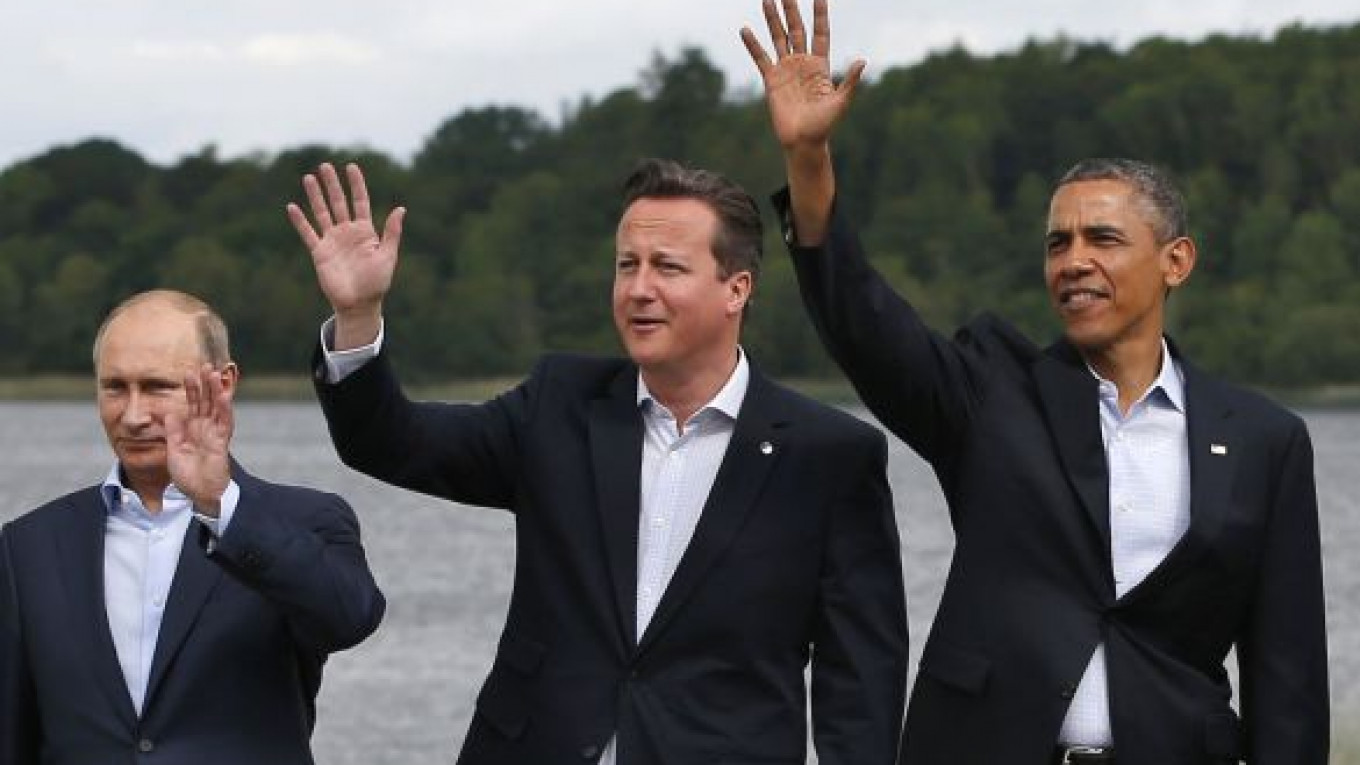Russia and the United States have a signed a bilateral agreement for protecting, controlling, and accounting for nuclear materials, continuing important aspects of a now-defunct program that was seen as a cornerstone of post-Soviet cooperation between the former foes.
President Barack Obama hailed the deal as an example of "the kind of constructive, cooperative relationship that moves us out of a Cold War mindset" after a private meeting with President Vladimir Putin at the G8 summit in Northern Ireland late Monday.
The new framework will replace what is known as the Nunn-Lugar Program, launched in 1992, under which the U.S. Defense Department helped pay for securing and dismantling weapons of mass destruction in the former Soviet Union to prevent them from falling into the wrong hands.
"It was a very successful project. One of very few successful projects of the last 20 years," said Alexei Arbatov, an arms control expert at the Moscow Carnegie Center. The new agreement "means that this mentality of post-Cold War cooperation is still alive, although some indications may suggest that it isn't," he said.
In October, Moscow said the Nunn-Lugar Program was outdated and refused to renew it. The Kremlin complained about the program's "very aggressive and intrusive" approach to securing nuclear material in Russia, a spokesman for the National Security Council said, Reuters reported. It also said Russia no longer needed financial assistance.
The Nunn-Lugar Program expired Monday.
The signing was a ray of light for U.S.-Russian relations, which have been rocked over the past year by public spats over a wide range of issues, including bilateral adoptions and the Syrian civil war, as well as continuing friction over NATO's U.S.-led missile defense plans.
"It's a very important agreement. It shows that Washington and Moscow are trying to improve their relations," said Vladimir Batyuk, a security expert at the Institute for U.S. and?Canadian Studies.
Details about the agreement were vague as of Tuesday evening. A brief fact sheet provided by the White House said it would build upon the success of the Nunn-Lugar Program and would be conducted under an existing OECD framework agreement and a related bilateral protocol.
At issue is the sharing of safety and accounting expertise, mostly with third countries, Arbatov said. The agreement might also include a final word about dismantling nuclear submarines, but otherwise it is not about dismantling weapons, he said, cautioning that he had not seen the actual text.
Former Senator Sam Nunn, who sponsored the original nonproliferation deal with former Senator Richard Lugar, applauded the new one, but noted that areas of cooperation on chemical and biological weapons would not continue.
"We must find ways beyond this agreement to work together on these critical issues," he told Reuters. "I believe that we will."
Russia and the United States no longer see chemical weapons as a priority because they are both close to liquidating their stockpiles under existing agreements, Batyuk said. "The majority of Russia's stockpiles have been destroyed and will cease to exist in the foreseeable future. As far as I know, the situation in the United States is the same," he said.
Batyuk argued that while the nuclear deal was important, it was less significant than a pledge made by Obama and Putin to cooperate on cybersecurity. "Nuclear weapons are a legacy of the 20th century. The challenge of the 21st century is cybersecurity," he said by telephone on Tuesday.
Contact the author at j.earle@imedia.ru
Related articles:
A Message from The Moscow Times:
Dear readers,
We are facing unprecedented challenges. Russia's Prosecutor General's Office has designated The Moscow Times as an "undesirable" organization, criminalizing our work and putting our staff at risk of prosecution. This follows our earlier unjust labeling as a "foreign agent."
These actions are direct attempts to silence independent journalism in Russia. The authorities claim our work "discredits the decisions of the Russian leadership." We see things differently: we strive to provide accurate, unbiased reporting on Russia.
We, the journalists of The Moscow Times, refuse to be silenced. But to continue our work, we need your help.
Your support, no matter how small, makes a world of difference. If you can, please support us monthly starting from just $2. It's quick to set up, and every contribution makes a significant impact.
By supporting The Moscow Times, you're defending open, independent journalism in the face of repression. Thank you for standing with us.
Remind me later.






